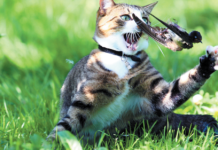More people are feeding their pets homemade diets today than a decade ago even though homemade meal plans for cats are often rife with nutritional inadequacies and imbalances. Researchers made the finding when they surveyed some 1,800 households with cats in the U.S. and several other countries. They also found that more cat guardians are feeding their pets raw animal foods in the mistaken belief it’s good for the system. And because trends in animal nutrition shadow trends in human nutrition, some people are also feeding their cats vegetarian diets, despite the fact that cats need animal-based foods to thrive.
Much of the trend may be because of “the humanization of companion animals,” write the investigators in the journal Veterinary Record. Because people want to bond with their cats like never before, they may feed homemade diets to pamper their pets in the belief that they will be more palatable — or better for their cats because they’re made with love. Similarly, if they are vegetarians, they may feel more bonded to a pet if the pet does not eat animal foods. And raw foods are often promoted with earnest but nonetheless false claims of increased energy and improved health overall. Such claims are hard to resist.
How much have feeding practices shifted, not just in the U.S. but in other English-speaking countries, including Canada, New Zealand, the UK, and Australia? In 2008, 13 percent of people with cats were estimated to be feeding them at least some homemade cat food, the researchers found when combing through old studies. Today, almost half of people who have cats make sure at least some of their meals are homemade. Exclusively homemade diets are more common for cats in the U.S. than in a number of other countries.
Similarly, in 2008, less than 10 percent of pet cats were fed any meals made with raw animal food. Today, more than 50 percent are given some raw-animal meals. And close to one in 20 cats is given at least some vegetarian fare.
Alarming nutrition concerns
The researchers point out that the most significant nutrient deficiencies in homemade diets are for calcium, phosphorus, vitamin D, and essential amino acids — the building blocks of protein. Diseases associated with feeding unbalanced diets include pansteatitis (inflammation of fat tissue that can lead to a heightened and painful sense of touch), faulty regulation of bone metabolism and skeletal abnormalities, myelopathy (a disorder of the spinal cord that can lead to paralysis), and seizures.
Diets made with raw animal foods are also associated with nutritional deficiencies. At the same time, they pose the risk of feeding cats harmful bacteria on raw meat that are not killed with cooking. These same bacteria can also sicken people if, say, they don’t wash their hands or utensils carefully enough after handling.
As for vegetarian diets, they are a losing proposition for cats from the get-go. It is extremely difficult for a cat to get all the essential nutrients he needs to maintain health from a strictly plant-based meal plan.
Love your cat, but settle for a little extra nutrition
Long gone are the days when cats were kept to flush rodents out of barns. More and more, they are part of our families, and the researchers say that “may contribute to the feeding of unconventional diets.” The intention to treat our cats well makes sense, but it doesn’t square with nutrition science.
To insure that your cat has the best nutrition, and therefore the best health possible, the World Small Animal Veterinary Association generally recommends choosing food produced by a reputable manufacturer that has been formulated or tested to meet the nutrition guidelines of the Association of American Feed Control Officials. (If it has, it will say this on the label.) So do we. And the American Veterinary Medical Association and American Animal Hospital Association have come out definitively against raw food for felines.
True, a pet food manufacturer isn’t going to put the love into your cat that you will. But to riff off an old ad for




